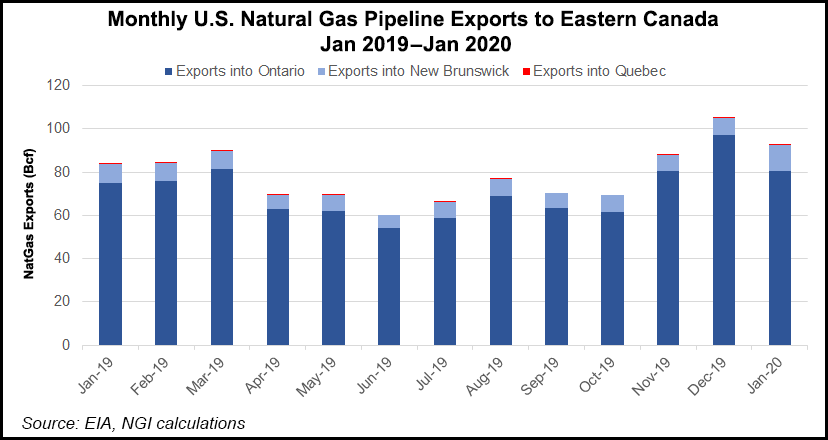NGI The Weekly Gas Market Report | Infrastructure | M&A | NGI All News Access
Calgary’s 7G Secures ‘Responsible’ Natural Gas Supply Deal with Energir
A natural gas version of marketing eco-labels has won a toehold in Canada by playing a role in a sale from Alberta to Quebec by Seven Generations Energy Ltd. (7G).

The operator earned the Fair Trade and Sustainable Palm Oil–Equitable Origin (EO) green gas brand to land a supply contract for about 50 MMcf/d with Energir, the top Quebec distributor that serves 525,000 customers through 10,000 kilometers (6,000 miles) of pipelines.
As deliveries began this spring, the deal caught attention as a precedent in a province renowned for public pride inHydro Quebec’s zero-emission power dams and disdain for fossil fuels, oil and gas corporations, and pipelines.
“We expect to see more of this as energy companies respond to social and political pressure for environmentally and socially responsible resource development and use,” according to the Gowling WLG law firm.
The expectation is correct, said 7G in its latest annual environment, societal and governance (ESG) report.
“Sustainability does not mean a trade-off in profitability,” the Calgary-based firm said. “Energir’s natural gas agreement with 7G will see us receive a modest premium. The premium will help catalyze and fund our newly-created 7G Sustainability Fund.
“Through the fund we will support additional innovative sustainability projects aimed at reducing our environmental footprint, broadening our Indigenous partnerships and supporting responsible development.”
7G obtained the gas eco-label, a formal certificate through the EO 100TM Standard for Responsible Energy, to fit into a new Energir purchasing policy called Responsible Procurement of Natural Gas.
The Quebec utility’s policy promises “to promote business relations with proactive and responsible gas producers who are committed to being transparent and have demonstrated leadership in implementing ESG best practices.”
The 7G Quebec deal is a world first for EO, a New York City eco-label group that follows examples set with other products by the UK-based International Social and Environmental Accreditation and Labeling Alliance.
To earn the EO green gas brand producers and distributors comply with performance benchmarks for public disclosure, labor standards, finance, field practices, environment safeguards, and relations with communities and native tribes.
7G reported that obtaining the certificate required months of detailed evaluations with consultant help from the Pembina Institute, a 35-year-old Alberta environment watchdog with branches in British Columbia and Ontario.
The Calgary supplier qualified for the green gas label even though its Montney Shale production in northwestern Alberta uses hydraulic fracturing, which is banned in Quebec. Equitable Origin said it neither condones nor opposes fracturing but only seeks to assure that the controversial method follows high standards of environmental care.
The 7G corporate brand displays intent to fulfill sustainable industry ideals.
“Our name — Seven Generations — is based on an Iroquois concept that commits us to making decisions today that consider how those decisions will benefit and impact seven generations into the future,” it said in the ESG report.
© 2024 Natural Gas Intelligence. All rights reserved.
ISSN © 1532-1231 | ISSN © 2577-9877 | ISSN © 1532-1266 |
